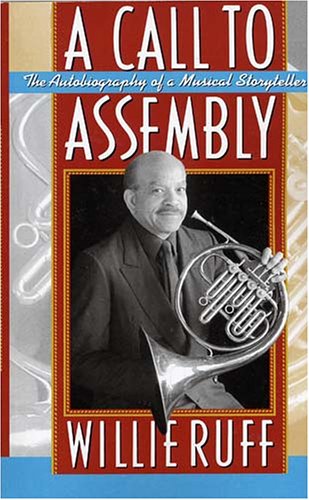A Call to Assembly: The Autobiography of a Musical Storyteller - Softcover

Music and learning ("Can't nobody take nothin from outta your head," said his first mentor, Daddy Long) set the course of Willie Ruff's life. He sopped up music and learning when he joined the army at age fourteen, coming under the influence of various fatherly music masters. While he was an undergraduate at Yale, it was Paul Hindemith's magnetic presence that expanded Willie's musical horizons. Later, playing the French horn with the Lionel Hampton band and forming the "Duo" with his old piano-playing army sidekick, Dwike Mitchell, Willie learned firsthand from powerful influence like Duke Ellington, Count Basie, Max Roach, Dizzy Gillespie. And through his years at Yale as a professor of music, the quest for learning never stopped.
But music wasn't all. A powerfully recurring theme of A Call to Assembly comes from Willie's curiosity about the black soldier in American history. It began when he was in grade school and witnessed an air show by an all-black squadron of fighter pilots from Tuskegee. Later, in the army, Willie met some of those pilots who had fought over Germany and Italy and risked courts-martial to gain the same rights white officers enjoyed. Years later, through a set of extraordinary circumstances, he came across a statement written in 1902 by another Alabama neighbor, an ex-Confederate general who commended the valor of Negro soldiers fighting in the Spanish-American War. It was, Willie writes, as if this general "laid a hand on me from the grave and gave me pride and understanding."
Willie Ruff's is an exhilarating story, told in a distinctive voice that rings clear and true, smart and funny, and is always moving.
"synopsis" may belong to another edition of this title.
He is founding Director of the Duke Ellington Fellowship Program at Yale, a community based organization sponsoring world-class artists mentoring and performing with Yale students and young musicians from the New Haven Public School System.
Ruff's 1992 memoir, "A Call to Assembly" was awarded the Deems Taylor ASCAP award. He has written widely on Paul Hindemith one of his teachers at Yale, and on his professional association with the American composers, Duke Ellington and Billy Strayhorn.
His collaborations with Yale Geologist, John Rodgers on the musical astronomy of the 17th century scientist, Johannes Kepler, resulted in an important "planetarium for the ear" currently on CD and published widely in international astronomy journals.
Ruff has also written on music and dance in Russia, and on the introduction of American Jazz in China where he has lectured in Mandarin. his next book, "Six Roads to Chicago" explore's the relation of culture in Chicago to life in its hinterlands.
Copyright 1991 Reed Business Information, Inc.
"About this title" may belong to another edition of this title.
- PublisherKepler Label
- Publication date2005
- ISBN 10 0971671826
- ISBN 13 9780971671829
- BindingPaperback
- Number of pages432
(No Available Copies)
Search Books: Create a WantIf you know the book but cannot find it on AbeBooks, we can automatically search for it on your behalf as new inventory is added. If it is added to AbeBooks by one of our member booksellers, we will notify you!
Create a Want
